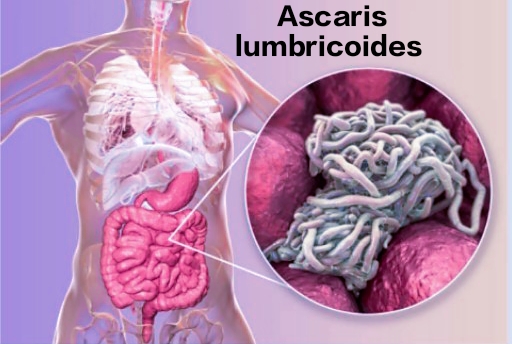Ascaris lumbricoides
Ascariasis may be a kind of roundworm infection. Adult worms that reproduce are quite a foot (30 centimeters) long. One of the foremost common worm infections in individuals worldwide, the infestation is unusual within the U.S. Most infected individuals have delicate cases with no symptoms. However, a serious infestation will cause serious symptoms and complications like other parasites Pinworm infections, and tapeworm infections.
 |
| Ascaris lumbricoides |
Ascariasis happens most frequently in kids in tropical and climatic zone regions of the planet, particularly in areas with poor sanitation and hygiene.
Symptoms
Most people infected with an infestation don't have any signs or symptoms. Moderate to serious infestations cause varied signs or symptoms, suggesting that a part of your body is affected.
 |
| The appearance of Ascaris lumbricoides |
• In the lungs
After you swallow the small (microscopic) infestation eggs, they hatch within the bowel, and the larvae also migrate through the blood or systemic lymphatics into the lungs. At this stage, you'll know the signs and symptoms of an asthma attack or respiratory illness, including:
• persistent cough
• Shortness of breath
• Wheezing
After disbursement for ten to fourteen days within the lungs, the larvae trip the throat; wherever you cough them up, you swallow them.
• In the intestines
The larvae mature into adult worms within the bowel, and the adult worms usually sleep in the intestines till they die. In a delicate or moderate infestation, the enteral infestation will cause:
- Vague abdominal pain
- Nausea and inborn reflex
- Diarrhea or bloody stools
If you have an oversized range of worms within the gut, you may have:
• Severe abdominal pain
• Fatigue
• Vomiting
• Weight loss or deficiency disease
• A worm in your vomit or stool
When should I examine a doctor?
Talk to your doctor if you have persistent abdominal pain, looseness of the bowels, or nausea.
Causes
Ascariasis is not spread directly from person to person. Instead, an individual should not come into contact with soil mixed with human or pig urine that contains infestation eggs or infected water. In some developing countries, human urine is used as fertilizer or poor sanitary facilities enable excreta to combine with soil in yards, ditches, and fields. Individuals can also benefit from consuming raw, infected pig or liver.
Small children usually play in the dirt, and infection will occur if they place their dirty fingers in their mouths. Unwashed fruits or vegetables fully grown in contaminated soil can also transmit the infestation of eggs.
The life cycle of a worm
Ingestion
The small (microscopic) infestation eggs cannot become infective while not coming back into contact with soil. Individuals will accidentally swallow contaminated soil through meager contact or by consuming raw fruits or vegetables that have been fully grown in contaminated soil.
Migration
Larvae hatch from the eggs in your bowel, so the enteral wall trips the center and lungs via the blood or systemic lymphatics. When the larvae have matured for about ten to fourteen days in your lungs, they enter your airway and travel up the throat, where they are coughed up and engulfed.
Maturation
Once they are back within the intestines, the parasites grow into male or female worms. Female worms are quite fifteen inches (40 centimeters) long and a bit less than one-quarter of an inch (6 millimeters) in diameter. Male worms are typically smaller.
Reproduction
If there are square measure both feminine and male worms within the intestines, and the eggs leave your body in order due, feminine worms will produce two hundred,000 eggs per day. The fertile eggs should be in the soil for a minimum of two to four weeks before they become infective.
The whole method — from egg activity to egg deposits — takes about 2 or 3 months.
Risk factors
Risk factors for infestation include:
Age
The majority of people with infestations are ten years old or younger. Children in this age group are also more vulnerable because they are more likely to play in the dirt.
Warm climate
Within the U.S., the infestation is very common in the Southeast. However, it's very frequent in developing countries with high temperatures year-round.
Poor sanitation
Infestation is widespread in developing countries wherever human organisms are allowed to combine with native soil.
Complications
Mild cases of infestation sometimes do not cause complications. If you have a significant infestation, doubtless dangerous complications could include:
Slowed growth
Loss of craving and poor absorption of digestible foods place kids with the infestation in danger of not obtaining enough nutrition, which might slow growth.
Intestinal blockage and perforation
In a serious infestation, a mass of worms will block a little of your gut. This will cause severe abdominal cramping and an inborn reflex. The blockage will even build a hole within the intestinal wall or appendix, inflicting internal injury (hemorrhage) or redness.
Duct blockages
In some cases, worms could block the slender ducts of your liver or exocrine gland, inflicting severe pain.
Prevention
The best defense against infestation is good hygiene and common sense. Follow the following tips to avoid infection:
Practice sensible hygiene.
Before handling food, always wash your hands with soap and water. Wash recent fruits and vegetables completely.
Use care once traveling
Use only drinking water, and avoid raw vegetables unless you'll peel and wash them.



